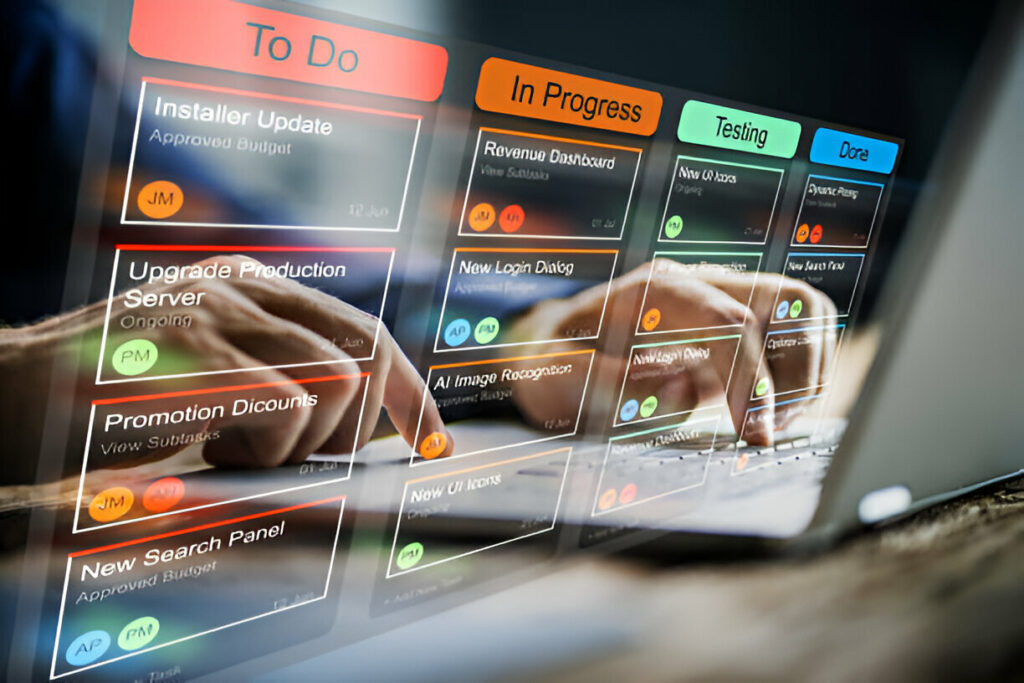Building Trust in Your Remote Team: A Leadership Guide
- April 29, 2024
- Aniq Syaz
Share This Article

Table of Contents
Remote work arrangements are becoming increasingly common in the rapidly evolving work landscape. While this flexibility offers numerous benefits for both employers and employees, fostering trust within a geographically dispersed team presents unique challenges for leaders. Trust is the cornerstone of any successful team, but in a remote setting, it becomes even more critical. It fuels open communication, collaboration, and accountability – all essential ingredients for a productive and innovative remote workforce.
This blog post explores the importance of trust in remote teams and equips leaders with actionable strategies to cultivate a thriving environment built on mutual trust.
The Malaysian Context and Increased Productivity
The Malaysian government’s embrace of flexible work arrangements (FWAs) presents a unique opportunity for organizations to unlock a multitude of benefits. This shift, particularly relevant in the wake of the COVID-19 pandemic, is a strategic move with far-reaching implications for both employers and employees.
The global pandemic acted as a catalyst for the widespread adoption of remote work arrangements. With lockdowns and social distancing measures in place, businesses were forced to adapt and embrace flexible work models. This large-scale experiment demonstrated the viability and even the advantages of remote work. It highlighted the potential for increased productivity, improved employee well-being, and a wider talent pool.
Recognizing the positive outcomes of flexible work arrangements, the Malaysian government actively supports their implementation. This forward-thinking approach acknowledges the changing landscape of work and aims to position Malaysia as a competitive hub for talent and innovation.
Here are some of the key reasons behind the government’s support for FWAs:
- Increased Productivity and Talent Pool: FWAs empower employees to manage their work schedules more effectively, potentially leading to increased focus and productivity. Additionally, by eliminating geographical barriers, companies can attract top talent from across the country, fostering a more diverse and skilled workforce.
- Improved Work-Life Balance: FWAs offer employees greater control over their work-life balance, reducing stress and promoting well-being. This translates to a happier and more engaged workforce, ultimately benefiting both employees and employers.
- Reduced Overhead Costs: Flexible work arrangements can lead to significant cost savings for companies. Reduced office space requirements, lower commuting costs for employees, and potentially lower energy consumption all contribute to a more sustainable and cost-effective business model.
- Economic Growth and Competitiveness: By embracing FWAs, Malaysia positions itself as a progressive and employee-centric nation. This can attract foreign investment and enhance the country’s overall economic competitiveness in the global marketplace.
While the government’s support for Flexible Work Arrangements (FWAs) provides a significant boost, it is ultimately up to individual organizations to implement these arrangements effectively. Trust is crucial when managing a remote workforce, and leadership plays a key role in fostering a culture of transparency, communication, and accountability.
By adopting best practices for remote team management, Malaysian organizations can fully leverage the benefits of FWAs. This progressive approach can lead to a more engaged workforce, increased productivity, and a competitive edge in the global marketplace. To thrive in the new remote work landscape, Malaysian companies must prioritize building a culture of trust within their remote teams.
Why Trust Matters in Remote Teams

Many Malaysian managers might feel apprehensive about letting go of the traditional office environment. Here are two common concerns, and how trust can address them:
1. Productivity Anxiety: How can I be sure my employees are working effectively when they’re not in the office?
Building Trust is the Answer: When employees trust their managers, they feel empowered and take ownership of their work. This translates to increased focus and productivity, even when working remotely. By setting clear goals and expectations, and providing the necessary resources and autonomy, managers can demonstrate their trust. Additionally, utilizing project management tools and fostering open communication allows for better visibility into work progress.
2. Accountability Anxiety: How can I ensure deadlines are met and projects are delivered successfully with a remote team?
Building Trust is the Answer: Trust fosters a sense of accountability within a remote team. When employees feel valued and trusted, they are more likely to go the extra mile to meet deadlines and deliver high-quality work. Regular performance reviews and check-ins can track progress and identify any roadblocks, while recognizing achievements reinforces positive behaviors.
Leaders, Here’s How to Build Trust in Your Remote Team:

1. Set Clear Expectations and Goals: Transparency is key. Clearly define project goals, individual responsibilities, and communication protocols for your remote team. This ensures everyone is on the same page, fostering a sense of reliability and direction.
- Example: Outline key performance indicators (KPIs) for each team member. This provides a clear framework for measuring progress and allows employees to understand how their work contributes to the overall goals.

2. Prioritize Open Communication: Regular communication is vital to bridge geographical gaps and build trust in a remote team. Encourage video calls to allow for non-verbal cues that strengthen rapport. Utilize instant messaging platforms for quick updates and project management tools for team collaboration and information sharing.
- Example: Schedule weekly team video meetings to discuss ongoing projects, address any roadblocks, and celebrate achievements. Additionally, implement a “virtual watercooler” channel on your communication platform where team members can chat casually and build social connections.

3. Embrace Asynchronous Communication
Recognize that team members may have diverse schedules in a remote work environment. Utilize asynchronous communication tools like emails and project management platforms for tasks that don’t require real-time collaboration. This empowers employees to manage their workloads effectively and reduces the pressure to be “always online.”

4. Empower Your Team: Micromanagement is a trust-killer. Equip your remote team with the resources and autonomy they need to succeed. Regularly solicit feedback and involve them in decision-making processes. This demonstrates your trust in their abilities and fosters a sense of ownership.
- Example: Instead of micromanaging daily tasks, provide clear project objectives and allow team members to choose their preferred methods of achieving them.

5. Foster Social Connection:
Just because your team is remote doesn’t mean they can’t build strong relationships. Schedule virtual team-building activities, coffee breaks, or social events to create a sense of camaraderie and belonging. Consider investing in virtual team-building tools that facilitate interactive games and activities.
- Example: Organize a virtual escape room challenge or a remote cooking class. These activities not only provide entertainment but also encourage collaboration and communication in a fun and light-hearted way.

6. Recognize and Reward Achievements:
Celebrating successes and milestones, both big and small, is crucial for keeping your remote team motivated and engaged. Public recognition within the team and organization fosters a sense of accomplishment and encourages healthy competition.
- Example: Implement an “employee of the month” program highlighting exceptional work and contributions. Additionally, consider offering rewards for exceeding goals or completing challenging projects.

Extra Tips to Build a High-Trust Culture Within a Remote Workplace
Here are some additional strategies you can implement to foster a high-trust culture within your remote workforce in Malaysia:
1. Invest in Training and Development: Equip your managers with the skills they need to effectively lead and manage remote teams. This includes training on communication, building trust, and virtual collaboration tools. When managers feel confident and equipped, they can create a more positive and trusting environment for their teams.
2. Embrace Technology: Utilize project management platforms, video conferencing tools, and instant messaging apps to facilitate seamless communication and collaboration. Technology can bridge geographical distances and create a sense of virtual togetherness. Provide your employees with the necessary tools and resources to be successful in a remote setting.
3. Recognize and Reward Achievements: Celebrate successes and milestones, both big and small. This helps to keep remote employees feeling valued and motivated. Public recognition within the team and organization can foster a sense of accomplishment and encourage healthy competition.
4. Conduct Regular Remote Team Evaluations: Gather feedback from both managers and employees to identify areas for improvement and ensure everyone feels supported and heard. Regular check-ins allow you to address concerns early on, preventing issues from escalating and eroding trust.
5. Promote Work-Life Balance: Encourage employees to take breaks, disconnect after work hours, and maintain a healthy work-life balance. Respecting their personal time demonstrates trust and prevents burnout.
Building Trust is an Ongoing Process
Building a strong foundation of trust in your remote team requires consistent effort and a commitment from both leaders and employees. By implementing these strategies, you can nurture an environment of transparency, communication, and empowerment, paving the way for a highly-engaged and productive remote workforce in Malaysia. Remember, successful remote leadership is all about building trust – it’s the glue that holds your team together, even when miles apart.
Share This Article

